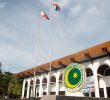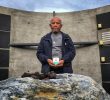The Initiatives for Peace in Mindanao and the US Troops Out Now! Mindanao Coalition said humanitarian missions are military operations that would “allow the US to maintain a permanent presence in the Philippines without much public scrutiny.”
Medical missions and infrastructure projects are a cover for the covert and clandestine operations that US Special Forces are carrying out in the country over indefinite periods of time, according to the groups opposing the VFA. The building of roads and bridges, among others, will mainly serve the interests of the US military and foreign big business instead of the local population.
In 1998, the VFA between the United States and the Philippines was signed to “strengthen international and regional security in the Pacific” and to promote common security interests.
Under the VFA, both governments supposedly reaffirmed their �obligations� under the Mutual Defense Treaty (MDT) of August 30, 1951, aimed at strengthening the fabric of peace in the Pacific. One of the signatories from the Philippines of the MDT was the father of President Gloria Arroyo, Diosdado Macapagal.
In 2001, after the September 11 attack, US President George W. Bush declared an all-out war against terrorism, which the Philippine government fully endorsed.
A year after, the US Department of Defense and the Philippine Department of National Defense approved the Mutual Logistics Support Agreement (MLSA) to strengthen the �interoperability, readiness, and effectiveness of their respective military forces through increased logistic cooperation,” in accordance with the MDT and the VFA or the Military Assistance Agreement.
The MLSA was supposed to be in force for five years, after which it was supposed to expire. But after its supposed expiration on November 21 last year, militant groups like Bayan were surprised to hear from General Edilberto Adan of the Presidential Commission on the VFA of VFA’s extension in early January this year.
Bayan claimed that the public was not informed of the review—which was supposed to be done a year before the agreement’s termination—and its results.
Since 2002, Balikatan has become an annual military event, aiming to intensify the fight against the perceived enemies, also called terrorists, of both the US and Philippine governments.
National Security Adviser Norberto Gonzales described Mindanao as teeming with several armed groups like the Moro Islamic Liberation Front, New People’s Army, Moro National Liberation Front, ASG, Rajah Solaiman and JI among others.
Gonzales called these groups as the government’s “headaches”. The Arroyo government launched Oplan Bantay Laya (Freedom Watch) I and II to curb threats of terrorism.
In Davao City, Mayor Rodrigo Duterte expressed his solidarity with the Moro people in opposing the Balikatan though his weekly television program.
“I will not allow it, especially here in Davao,” Duterte said, comparing Balikatan to a magnet that would only �bring trouble to the people,” he said.
The progressive parytlist bloc in the House of Representatives filed House Resolution 458 calling for the abrogation of the VFA. They will also file another resolution that seeks to abrogate the Mutual Defense Treaty. (Marilou M. Aguirre/davaotoday.com)










